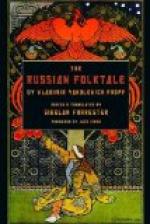Re-creative method of story-telling, 113-17.
Red Riding Hood, chap-book, 189; a romantic type, 232-34.
References;
chapter I, 12;
chapter II, 87-89;
chapter III, 154-57;
chapter IV, 201-03;
chapter V, 243-44.
Relation,
of contemplative imagination to language-training,
47-48;
of contemplative imagination to power
of observation, 47-48;
of contemplative imagination to science,
52-53;
of literature to intellect, 53-54;
of sound to sense or meaning, 55;
of sound to action, 55-56;
of phonics and emotional effect, 55;
of gesture to story-telling, 105-06;
personal, between the story-teller and
listener, 107-10;
of reading to story-telling, 127;
of reading to literature, 10, 11, 38,
127;
of rhyme to meaning, 56;
of fairy tales to nature study, 6, 47-48;
of fairy tales to industrial education,
71-73;
of fairy tales to child, 3-11;
of dramatization to story-telling, 138-54;
of fairy tales to literature, 37-70;
of fairy tales to composition, 54-70;
of fairy tales to story-telling, 90-91.
Repetition, 26-28, 205-11.
Representation, 135-38.
Re-telling of fairy tales, 101-02.
Return, creative, from child,
in telling of fairy tales, 119-54:
in language, 125-27;
in inquiry, 127-29;
in construction, 129-30;
in artistic expression, 130-54;
in paper-cutting, 130-31;
in drawing, 132;
in painting, 132;
in song, 132-33;
in rhythm, 133-34;
in game, 134-35;
in dance, 137, 145, 147;
in dramatization, 138-54;
illustrated, 145-54, 265-72.
Reynard the Fox,
place in the animal tale, 212;
history, 172-74;
chap-book, 185, 186, 190, 196.
Rhyme, 56.
Rhythm, in fairy tales, 26-28;
plays, 133-34.
Robin’s Christmas song, 78-79.
Romantic tale, 228-34; types of, 228-34, 275-86.
St. Nicholas, Stories retold from, 241.
Sanskrit Tales, 171.
School editions of fairy tales, 262-64.
Science, relation of contemplative imagination to, 52-53.
Sea Fairy and the Land Fairy, 236-37.
Selection of fairy tales by teacher, psychological or logical, 95-96.
Sense impression, 17-18.
Setting,
element of fairy tale as short-story,
77-82;
sequence in, 78-79;
story told by, 81-82;
and phonics, 79-81.
Sheep and Pig, 215.
Short-story,
fairy tale as, 70-87:
elements of, 70-71;
ways of writing, 71;
characters, 71-73;
plot, 73-77;
narration in, 74-75;
description in, 75;
setting, 77-82;
elements of, blended, 82-84;
tales tested as, 84-87;
telling of, 90-154.
Silhouette pictures, cutting of, 130-31.




